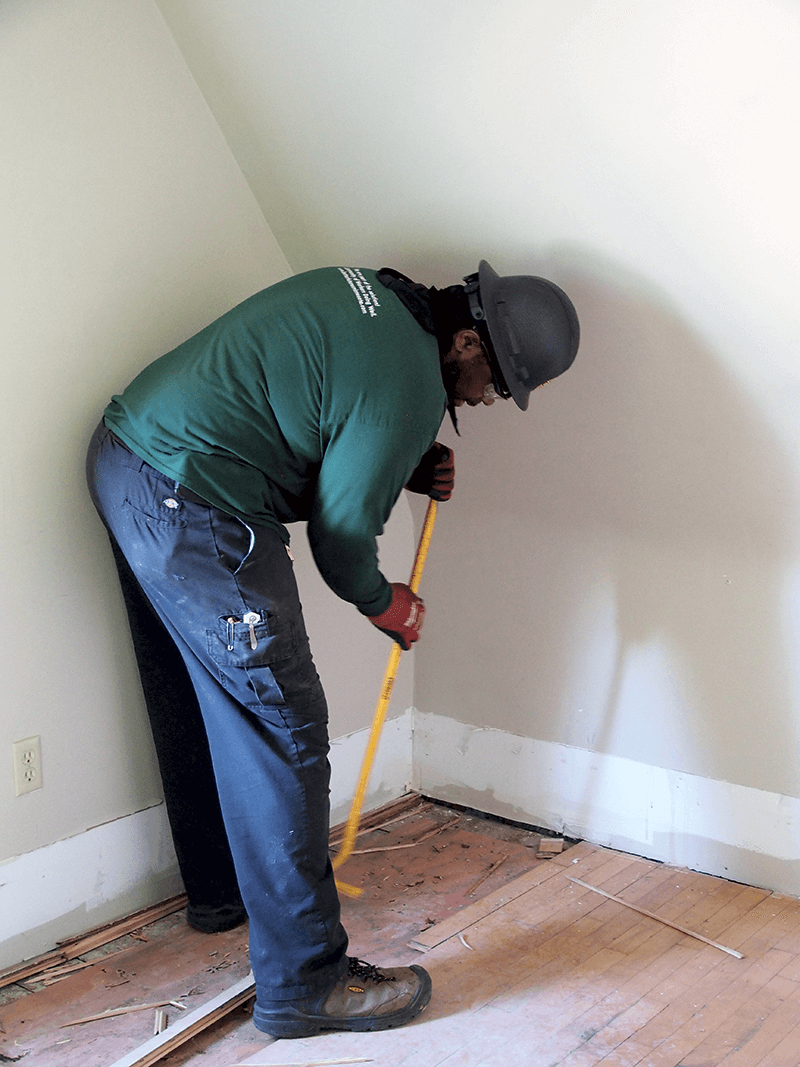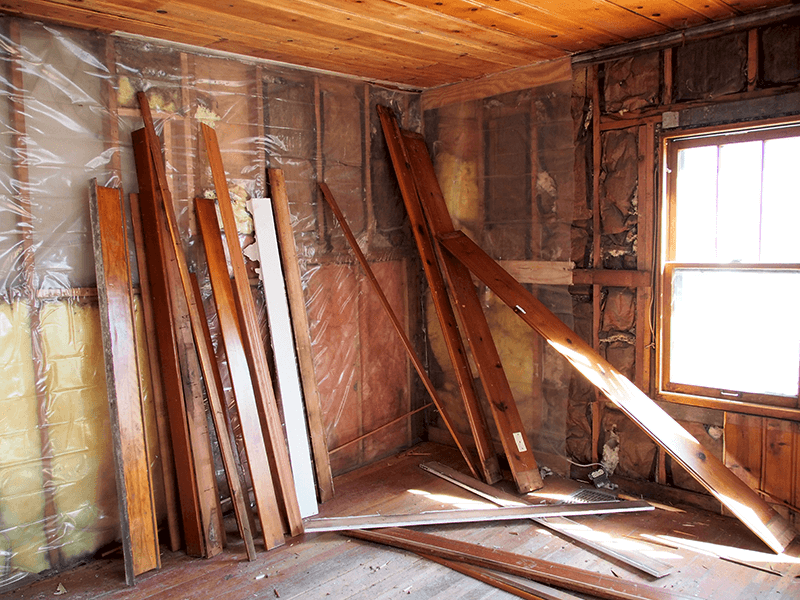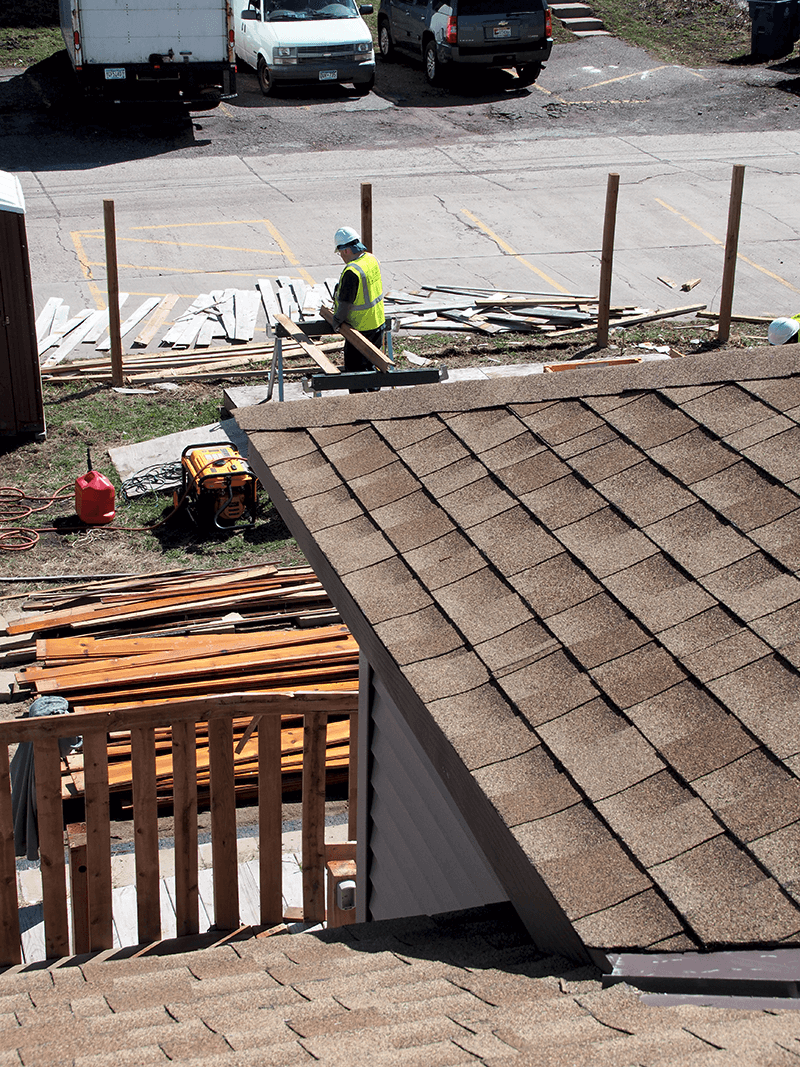On the southeast corner of 39th and Central avenues NE, workers in neon yellow vests and hard hats carried armloads of wood paneling and flooring to a staging area of sawhorses. A compressor hummed, punctuated by air bursts like one would hear when reroofing a house. But this handheld instrument was reversing the process, propelling each nail backwards through the knotty pine or oak boards so the holes could be filled and the boards refinished by a new user.
It’s called deconstruction. The City of Columbia Heights owns the house and plans to let the fire department use it for a practice burn in early May. But unlike other burns, they decided to have reusable materials such as trim and doors dismantled for salvage first. A resident connected the city to Better Futures Minnesota, a nonprofit workforce development organization, to do the work. Better Futures’ crew even dismantled a perimeter fence. The whole job took about five days.
Materials will be offered for sale at a fraction of new retail cost at Better Futures’ Reuse Warehouse at 2620 Minnehaha Avenue in south Minneapolis. DIYers, rental property owners, cabin owners, artists and creative contractors are among those who shop at the store. For example, the second day the crew worked at the Columbia Heights house, Northeast artist Layl McDill found a sink at the warehouse. It’s for her new studio space, purchased for $25 compared to new at $149.
Columbia Heights development
Mitchell Forney, community development coordinator for Columbia Heights, said the city is acquiring properties for future housing or commercial development. “Ultimately the goal is the removal of nonconforming single-family homes. These are homes that are zoned commercial and are highlighted as commercial or multifamily by the city’s comprehensive plan. The priority is to remove homes that are in poor condition or in strategic commercial areas. The structures on 39th and Central are in a strategic area as they are located next to privately and city-owned lots prime for redevelopment.” (The commercial property at 3851 Central is also now city owned.)
Columbia Heights’ Economic Development Authority (EDA) budgets $200,000 a year from its EDA levy for its commercial revitalization program, which seeks to purchase legally nonconforming single-family homes along business corridors to prepare them for redevelopment. “For the properties on 39th and Central, the city utilized its partnership with the Anoka County HRA (ACHRA),” Forney said. “The Anoka County HRA levies funds from Columbia Heights residents to pay for the county’s administration of federal, state and local housing and economic development programs. As part of this levy the Anoka County HRA sets aside economic development funds for Columbia Heights which can be accessed for projects approved by the ACHRA Board.”
Sustainability
Better Futures is also Columbia Heights’ vendor for the relatively new program of curbside pickup for organics recycling.
Sustainability is a broad term that in Columbia Heights means “reducing the environmental impact of human activities.” Various city staff and elected officials have promoted environmental considerations for many years, from Mayor Amàda Màrquez Simula’s Mayor’s Monarch Pledge and many items brought up by Council Member Connie Buesgens, who has extensive native plantings in her yard, to the activities of HeightsNEXT often chronicled in the Northeaster.
Columbia Heights is a GreenStep City, which is “a voluntary challenge, assistance and recognition program to help cities achieve their sustainability and quality-of-life goals,” (from https://greenstep.pca.state.mn.us/). Heights’ Sustainability Commission formed in August 2023, focusing first on best practices for sustainable purchasing and a complete streets policy. Andrew Boucher, city planner assigned to the commission, visited the deconstruction site and later told the Northeaster “what I saw, I feel is in line with what cities will have to do, plus the social justice aspect. It’s a really great program.”
More info on the commission is at https://www.columbiaheightsmn.gov/government/boards_and_commissions/sustainability_commission.php.
About Better Futures
The participants in Better Futures’ program have experienced incarceration and voluntarily enter the program which includes life coaching and other supports, leading to potential employment outside of the program within about a year. They obtain various certifications such as OSHA 10 safety training, classroom study about deconstruction, forklift and other trainings. Job assignments include appliance recycling, janitorial, lawn mowing and snow shoveling. For many, Better Futures is their first regular job.
“Better Futures has been an amazing partner to work with,” Forney said. “They have a quick response time and are willing to work around your schedule. They do amazing work and bring a much-needed service to the Twin Cities as the urban core seeks to redevelop obsolete properties and prepare for a better future. Not only do they operate as an efficient and competent business, they provide more than just services through their job training programs.”
For homeowners or business owners seeking deconstruction, the availability of tax deductions for the resale value of the materials offsets the cost of the services; how much depends on many factors including the owners’ tax bracket and the types and quantities of materials. In many cases, deconstruction is comparable to traditional demolition with the added benefits of keeping materials out of landfills and avoiding the resource and energy costs of making new things. Better Futures estimates their activities in 2023 had the carbon footprint equivalent of keeping 6,100 cars off the road.
Setting an example
“Columbia Heights has an increasingly aging housing stock and obsolete commercial portfolio, and projects like these seek to bring vitality and energy to the areas of the community in which the residents want them (outlined in the comprehensive plan),” Forney said. “The city is also engaged in planning for what the city will look like in the future. By prioritizing these strategic corridors, the city can prepare for projects years in the future while also diversifying the tax base. … By prioritizing sustainability the city is leading the way in its commitment to provide a safe and healthy community for all which will hopefully translate to residents setting similar goals.”
Full disclosure: Margo Ashmore works for Better Futures, marketing deconstruction and developing business.

Deconstruction Manager Quinn Jenkins removes hardwood flooring. (Margo Ashmore)

Knotty pine paneling ready to be de-nailed for reuse in another building.

Nails are removed and the boards packaged to avoid damage in transit. The salvage deconstruction wraps up soon and will have taken about a week. (Margo Ashmore)